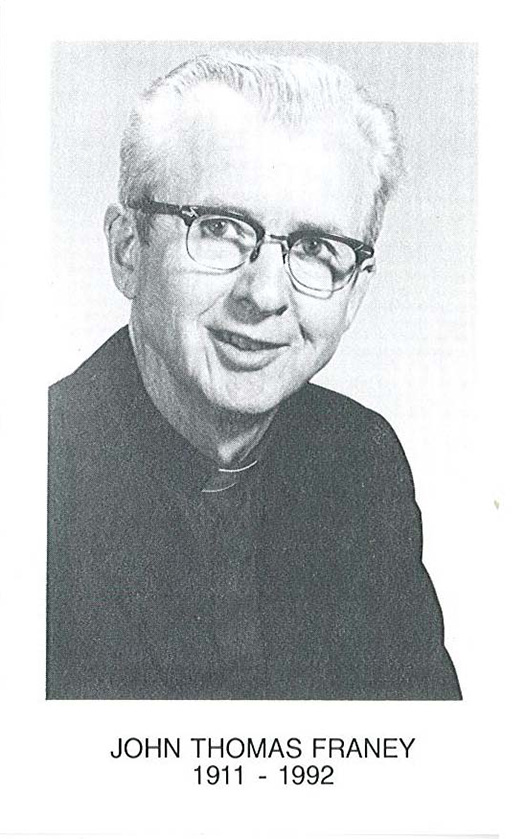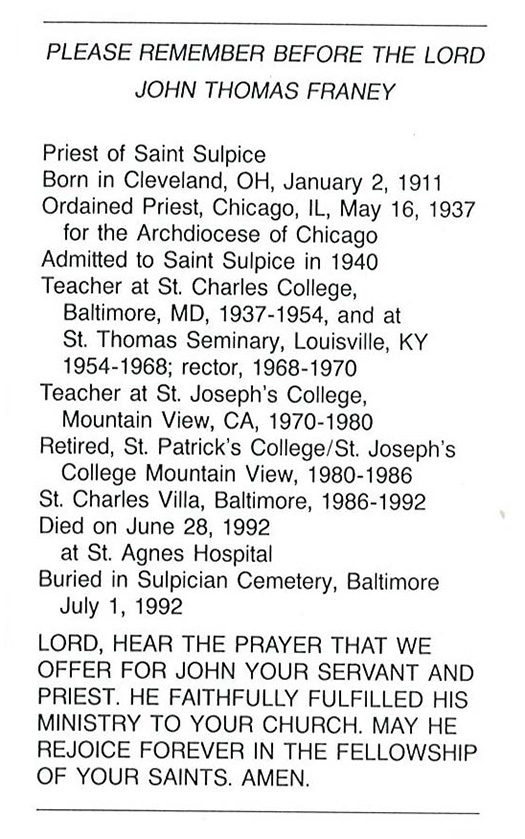Franey, Father John Thomas
1992, June 28
Date of Birth: 1911, January 2
January 26, 1994
Ever since someone, long ago, called us “Gentlemen” of St. Sulpice, various individual Sulpicians have been singled out as especially worthy of the title. Father Jack Franey seemed to all who knew him to belong in this special group if ever anyone did. He was gentle above all else — in manner, in speech, in his judgement of others when he was called upon to judge, and in his everyday approach to people and events.
The gentleness was accompanied always by a radiant smile and often with a phrase or two of Irish good humor to assure you that the smile was tailored to the person and the occasion and by no means a fixed all-purpose grin. An honest smile, in other words.
Honesty seemed to matter greatly to him. He would never hesitate to tell you the truth about yourself — gently, of course — whenever you needed to hear the truth. Because he was so honest, he was never very good at euphemisms and some of his forthright phrasing startled but then amused you.
This same respect for truth turned this man of deep faith into an occasional skeptic when, for example, he was asked by advocates of some popular devotion to accept an especially hard-to-swallow religious claim. On a visit to Cologne cathedral back in 1971, for example, he had trouble with the pious legend that the golden casket in the sanctuary there contained the bones of the three Magi. For years thereafter he was subjected by his former traveling companions to repeated taunts about his lack of faith. He would just smile.
Honor, is, of course, one of the prime qualities of a gentleman and that was verified in Jack Franey. He kept his promises. He scrupulously guarded secrets committed to him. He was invariably above gossip. That people trusted him was surely a principal reason for his being the depository of so many confidences from students and others and a major factor in his immense popularity.
Not every gentleman is thereby a good teacher, but Father Franey was both, not only because he was intelligent and careful in his preparation but even more because he was untiringly patient. “You can do it. You can do it,” he would repeat, antiphon-like, in the ear of many a struggling young student. It became his trade mark. Those whom he tutored, especially the less gifted ones, never ceased being grateful for the extra hours he had devoted to helping them.
Like all priests close to him in age he had to adjust to an immense set of changes in the church during and after the Council. Not only did he cooperate with the updating programs offered to priests by the archdiocese in which he was then laboring, but he tried to build on those programs for years afterwards by study and by specific questions directed to whoever might be available to answer him. In every way he was a conscientious son of the church, with deep respect for her traditions and untiring enthusiasm for her renewal.
Respect for what was old also took the form, in his case, of a somewhat comic reluctance to part even with physical items that had long since gone out of style: inconsequential things such as a shoe brush dating from before ordination and a Boy Scout flashlight considerably older still. This quirk furnished his family and friends with many an excuse for poking affectionate fun at Father Franey.
A crowning trait of this good man was a simplicity and innocence that endeared him to relatives, including even distant ones, to colleagues and students. This was reflected in the sparsity with which he furnished his room, the neatness of his person and the total lack of clutter in his life as a whole. He got along with the minimum of this world’s goods, lived frugally, spent carefully and saved his money but only in order to share generously with those in need.
His life activities were correspondingly modest. In his fifty years of Sulpician service he changed addresses only twice, from St. Charles, Baltimore, to St. Thomas, Louisville and then to St. Joseph’s in California.
John Thomas Franey was born in Cleveland, OH on January 2, 1911, the fifth of six children born to Michael Franey and Margaret Connerton Franey. The family moved from Cleveland to Erie PA and Suffern NY before settling permanently in Chicago, where Jack attended St. Ignatius High School and Loyola University. In 1931 he entered St. Mary’s, Paca Street as a student for the Archdiocese of Chicago. He studied theology at St. Mary’s, Roland Park and was ordained from there on May 16, 1937 for the Archdiocese of Chicago and the Society of St. Sulpice. Two Franeys had already embraced the religious life: his sister Helene, who would eventually be named superior of her community, the Sisters of Providence of Saint-Mary-of-the-Woods, and his brother Louis who had been ordained for the Rockford IL diocese and later became its chancellor.
Jack did graduate work at the University of Maryland and the Catholic University of America and made his Solitude in 1939-1940 as part of the last Solitude group to use the old mansion on the grounds of St. Charles College. His Solitude year interrupted an assignment on the faculty of the College that began in 1937 and lasted until the spring of 1954. He had been Prefect of the Juniors from 1949 on. In 1954 he was assigned to the faculty of the still-fledgling St. Thomas Seminary in Louisville where he remained until 1970, more than long enough for him to become a legend there. He was soon named academic dean and vice-rector and, in 1968, rector.
The early years at St. Thomas were a joyous time for him despite a certain amount of physical deprivation because of severe institutional poverty. The later years brought many a headache and heartache of the same type experienced in seminary after seminary during the friction-filled 1960s. Finally, in the spring of 1970 he and the rest of the seminary family celebrated a painful final graduation ceremony and St. Thomas became history.
Jack moved to the Mountain View campus of St. Joseph’s high school seminary, where he became assistant to the principal and then, when he had again to be part of the sad demise of a seminary, he transferred to St. Patrick’s College to live nominally in semi-retirement but actually as a valued contributor to the working of that institution. All through these years in California he had also served the weekend needs of parishes of the area.
He retired to St. Charles Villa in the summer of 1986. Never in very robust health, Jack was to experience a series of problems rather soon after his arrival. First, a sudden deterioration of the retina in one of his eyes. Then, in the spring of 1988, a severe fall and a leg fracture that required his moving, permanently as it turned out, to the infirmary of St. Martin’s Home. His sight problems grew worse and it became harder for him to get around.
He was cheerful under these circumstances but was also quite uncomfortable under the restrictions that his illnesses imposed on him. Another fall occurred, then mental confusion and eventually the need for hospitalization. His stay in St. Agnes hospital was mercifully brief. He died on Sunday morning, June 28, 1992. His funeral brought friends from as far away as California and expressions of regret and sympathy from almost countless alumni and other friends of every rank and description. He was indeed one of the great Sulpicians of his time.
John A. Ward, S.S.
St. Charles Villa


